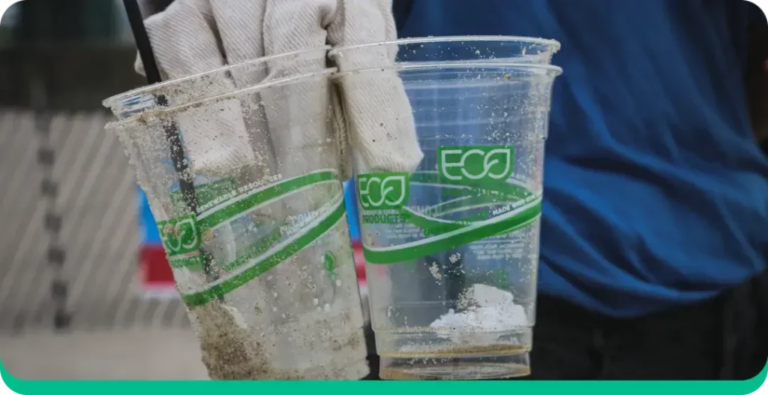Did you know that the term greenwashing was created in 1986, and it has its origins in literal “washing” of things? In this article, you can find out more about its history, its present, and how we, as individuals, can become more responsible in spotting and stopping it!

I remember the first time I found that tag with three green arrows chasing each other in a circle in its corner – the recycling symbol. It was hanging from the bathroom rack of a hotel with the message that I – a teenager, as it must have happened in the 90s on a family vacation – could save the planet if only I reused my towels. You know, the message that starts with “Every day millions of gallons of water are used to wash towels that have only been used once…” and ends in the double option of either hanging up the towel – in case you decide to reuse it – or leaving it on the floor to get it replaced. As soon as I recovered from the disappointing realization that luxury is not sustainable, not even for a day, I faced the options in front of me like a Choose Your Own Adventure book’s protagonist. (Like I said, it must have been in the 90s.) I bought the whole thing. I wanted to be a good human being. It also made complete sense: it required the kind of sacrifice one makes in her own home. I hung up the towel because it felt good to do good.
In 1986, Jay Westerveld, a 24-year-old ecologist, saw a similar little tag in a Fiji hotel and felt otherwise. The fact that he was an ecologist might have contributed to his suspicion about the real motives beyond the hotel’s towel message: the hotel was in the middle of an expansion near sensitive islands’ ecosystems. Westerveld ran the math in his head and concluded that “saving the towels” helped the hotel more than it helped the planet. While the initiative had little environmental impact, the hotel could save money on energy, water, even their cleaning staff. Instead of the marketing campaign, they could have invested money in a less damaging laundry detergent or non-plastic packaging and gotten rid of the wrapped soaps, the shampoo tubes, the plastic cups (also wrapped in plastic), the plastic garbage bags, et cetera. Also, there were no signs of an actual “green policy”: the hotel employees wouldn’t ride bikes to work, and the hotel management was not known for volunteer work in their local communities. That little tag in the bathroom is a convenient way of showing to be conscious instead of doing it. And with that, Westerveld coined the term ‘greenwashing’: “Wash my towels please, just don’t ‘greenwash’ me” – as the Times Herald-Record quoted from Westerveld’s essay in which the term ‘greenwashing’ is said to appear for the first time. Ever since then, the act of making a brand appear more sustainable than it is, is called greenwashing.

Greenwashing allegations hit McDonald’s – the fast (beef) food giant whose greenhouse gas emission exceeds several European nations’ – when the hyped-up news of replacing its plastic straws with paper ones was followed by reports that those paper straws were not recyclable. When fast fashion giant H&M – which sells an estimated three billion articles of clothing per year – creates ads about recycling and uses green “Conscious Choice” hangtags on some of their items, sustainability-sensitive fashionistas hiss. Recycling some items and talking customers into buying said recycled items (for more) can’t make up for the billions of garments the company produces every year.The investment arm of Deutsche Bank, DWS, is under investigation over allegations that the company misleadingly claimed that more than half of the group’s $900 billion in assets were invested using environmental, social, and governance (ESG) criteria. The prosecutor’s office in Germany referred to the potential greenwashing as “prospectus fraud.”
Since early 2022, greenwashing has been gaining momentum in Europe. Customers and investors pressure companies to be ESG-proof while the only proof they now certainly have is their dependency on Russia’s oil and gas exports as a consequence of the war in Ukraine. Enormous amount of money is placed in ESG investments, therefore financial regulators are stepping up their oversight to prevent money managers from overstating the ESG nature of their products, according to a recent Reuters special report. In March 2023, The European Commission proposed rules to protect consumers from greenwashing tricks stating it as a “notable problem,” with 53% of green claims on products or services making “vague, misleading or unfounded information.”
The real “police” to punish green liars are, however, not the regulators. This sustainability writer isn’t going to present you with a lie, not even a white one, when it comes to my “conscious” choices: the other day, I did find myself at the racks of H&M eyeing a top for my daughter for $6. Yet, with all the information I have about the brand, I know two things: One is that I am about to put together the list of second-hand shops for children in Budapest, and the other is that now I have the great goal for my budget of being able to buy environmental friendly clothes. Customers armed with information and money will never go near a brand that not only does too little too late for the planet but makes expensive marketing campaigns to hide this fact. The only takeaway left for any business owner reading these lines comes from Paula Rosenblum, a top retail technology analyst: “Get real.”


